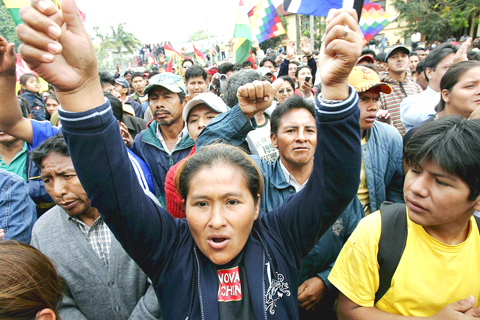Autonomy referendums in two Bolivian states yesterday could boost a movement to decentralize authority and block Bolivian President Evo Morales' populist reforms.
Morales’ quest to empower Bolivia’s long-oppressed Indian majority has alienated mixed-race residents in the nation’s eastern lowlands, fueling old regional grudges against a government centered in the western capital of La Paz.
The eastern states of Beni and Pando were likely vote yesterday to declare autonomy from the national government, following the lead of neighboring Santa Cruz, a hotbed of anti-Morales sentiment where 86 percent of voters opted for autonomy earlier this month.

PHOTO: EPA
Morales has dismissed all three referendums as illegal “surveys.” Organized by the pro-autonomy state governments, yesterday’s referendums were to be monitored by few observers and likely boycotted by the president’s supporters.
Still, the Bolivian tried to stave off the symbolic rejection of his government, making a rare trip on Friday to Pando’s remote capital of Cobija to deliver a new fleet of ambulances and announce a hastily assembled US$6 million infrastructure project.
In a country bitterly divided over Morales’ leftist policies, the eastern autonomy movement has replaced traditional political parties as his chief opposition. Deep regional ties have allied poor and sparsely populated Beni and Pando with wealthy Santa Cruz, and a fourth state, Tarija, holds an autonomy vote on June 22.
While the autonomy declarations call for steps toward a federalist model similar to the US, including the creation of locally elected state assemblies, they also seek more politically charged goals.
Statutes passed in Santa Cruz and on the ballot in Beni and Pando would protect huge cattle ranches and soy plantations from expropriation under Morales’ ambitious land reform. Santa Cruz also voted to withhold a bigger share of its natural gas reserves, which Morales needs to finance his reforms, although the state has yet to enforce the rule.
The autonomy movement has also stolen momentum from Morales’ central project, a draft constitution that would grant indigenous groups greater power.
While that document languishes on the shelf — it cannot become law until approved in a still unscheduled national referendum — the eastern lowland states are racing to sell Bolivians on their rival vision of a decentralized country.
“The constitution has not been put before the people,” while autonomy statutes are already up for vote, Beni governor Ernesto Suarez told La Razon newspaper. “They will be approved, and they will have an enormous legitimacy.”

DIALOGUE: US president-elect Donald Trump on his Truth Social platform confirmed that he had spoken with Xi, saying ‘the call was a very good one’ for the US and China US president-elect Donald Trump and Chinese President Xi Jinping (習近平) discussed Taiwan, trade, fentanyl and TikTok in a phone call on Friday, just days before Trump heads back to the White House with vows to impose tariffs and other measures on the US’ biggest rival. Despite that, Xi congratulated Trump on his second term and pushed for improved ties, the Chinese Ministry of Foreign Affairs said. The call came the same day that the US Supreme Court backed a law banning TikTok unless it is sold by its China-based parent company. “We both attach great importance to interaction, hope for

‘GREAT OPPRTUNITY’: The Paraguayan president made the remarks following Donald Trump’s tapping of several figures with deep Latin America expertise for his Cabinet Paraguay President Santiago Pena called US president-elect Donald Trump’s incoming foreign policy team a “dream come true” as his nation stands to become more relevant in the next US administration. “It’s a great opportunity for us to advance very, very fast in the bilateral agenda on trade, security, rule of law and make Paraguay a much closer ally” to the US, Pena said in an interview in Washington ahead of Trump’s inauguration today. “One of the biggest challenges for Paraguay was that image of an island surrounded by land, a country that was isolated and not many people know about it,”

‘FIGHT TO THE END’: Attacking a court is ‘unprecedented’ in South Korea and those involved would likely face jail time, a South Korean political pundit said Supporters of impeached South Korean President Yoon Suk-yeol yesterday stormed a Seoul court after a judge extended the impeached leader’s detention over his ill-fated attempt to impose martial law. Tens of thousands of people had gathered outside the Seoul Western District Court on Saturday in a show of support for Yoon, who became South Korea’s first sitting head of state to be arrested in a dawn raid last week. After the court extended his detention on Saturday, the president’s supporters smashed windows and doors as they rushed inside the building. Hundreds of police officers charged into the court, arresting dozens and denouncing an

CYBERSCAM: Anne, an interior decorator with mental health problems, spent a year and a half believing she was communicating with Brad Pitt and lost US$855,259 A French woman who revealed on TV how she had lost her life savings to scammers posing as Brad Pitt has faced a wave of online harassment and mockery, leading the interview to be withdrawn on Tuesday. The woman, named as Anne, told the Seven to Eight program on the TF1 channel how she had believed she was in a romantic relationship with the Hollywood star, leading her to divorce her husband and transfer 830,000 euros (US$855,259). The scammers used fake social media and WhatsApp accounts, as well as artificial intelligence image-creating technology to send Anne selfies and other messages